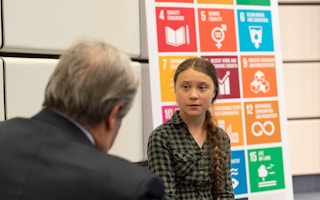Swedish climate activist Greta Thunberg has always responded swiftly to celebrity critics, and now some social media users believe she may have helped enable the arrest of a suspected human trafficker after the two sparred online.
Andrew Tate - a British-American internet influencer who gained notoriety for his violently misogynistic comments - targeted the youth climate campaigner in December with a post on Twitter saying he had 33 cars with “enormous emissions”.
After Thunberg told Tate, 36, to “get a life”, he hit back with a video in which he asked somebody out of shot to bring him pizza and to make sure the boxes were “not recycled”.
Soon afterwards, Tate was arrested in Romania on suspicion of human trafficking, rape and forming an organised crime group.
Following online speculation that the Romanian pizza brand featured in the video helped police confirm Tate’s presence in the country, Thunberg quipped on Twitter that “this is what happens when you don’t recycle your pizza boxes”.
A Romanian anti-organised crime unit representative said it was not the case that Tate’s arrest had been made as a result of the pizza boxes.
Thunberg, who was 15 when she began staging climate strike protests, turned 20 on Jan. 3.
“
So, we can’t save the world by playing by the rules, because the rules have to be changed. Everything needs to change and it has to start today.
Greta Thunberg, youth activist, Fridays for Future
She has repeatedly hit the headlines - including for comebacks at high-profile men who have insulted her online, such as former US President Donald Trump - as she calls for urgent action to protect the planet’s heating climate.
Here’s a timeline of Thunberg’s rise from a solo climate striker to a leading global campaigner:
August 20, 2018: Swedish student Thunberg, aged 15, skips school to protest outside parliament for more action against climate change.
August 26, 2018: She is joined by fellow students, teachers and parents at another protest and begins attracting media attention for her climate campaign.
September 2018: Thunberg begins a regular ‘strike’ from classes every Friday to protest climate issues. She invites other students to join her weekly “Fridays for Future” campaign by staging walkouts at their own schools.
November 2018: More than 17,000 students in 24 countries take part in Friday school strikes. Thunberg begins speaking at high-profile events across Europe, including UN climate talks in Poland.
March 2019: Thunberg is nominated for a Nobel Peace Prize. The number of students taking part in school strikes hits more than 2 million people across 135 countries.
May 2019: Thunberg is named one of the world’s most influential people by Time magazine, appearing on its cover. “Now I am speaking to the whole world,” she wrote on Twitter.
August 1, 2019: Thunberg hits back at “hate and conspiracy campaigns” after attacks by some right-wing lawmakers and commentators who questioned her credibility and described her as a “Nobel prize of fear”.
August 2019: Thunberg, who refuses to fly, sails from Britain to the United States in a zero-emissions boat to take part in a UN climate summit. Meanwhile, the number of climate strikers reaches 3.6 million people across 169 countries.
September 23, 2019: Thunberg delivers a blistering speech to leaders at the UN summit, accusing them of having “stolen my dreams and my childhood with your empty words“.
September 25, 2019: Thunberg is named as one of four winners of the 2019 Right Livelihood Award, known as Sweden’s alternative Nobel Prize.
October 11, 2019: Despite being bookies’ favourite to win, Thunberg misses out of the Nobel Peace Prize which goes to Ethiopian Prime Minister Abiy Ahmed.
November 2019: Caught out by a last-minute switch of location for UN climate talks from Chile to Spain, Thunberg hitches a ride on a catamaran boat crossing back to Europe.
December 11, 2019: Thunberg denounces “clever accounting and creative PR” to mask a lack of real action on climate change in a speech at the UN COP25 summit as the 16-year-old became the youngest individual to be Time Magazine’s person of the year.
March 13, 2020: As governments limit or ban mass gatherings to stem the spread of the new coronavirus, Thunberg urges students to make week 82 of the school strike digital, with the hashtag #ClimateStrikeOnline.
March 24, 2020: Thunberg says the swift measures brought in to stem the coronavirus pandemic show that the world can also take the rapid action needed to curb climate change. She also says on social media that she may have caught COVID-19.
April 30, 2020: Thunberg donates a $100,000 award she received to UNICEF to buy soap, masks and gloves to protect children from the coronavirus pandemic.

















